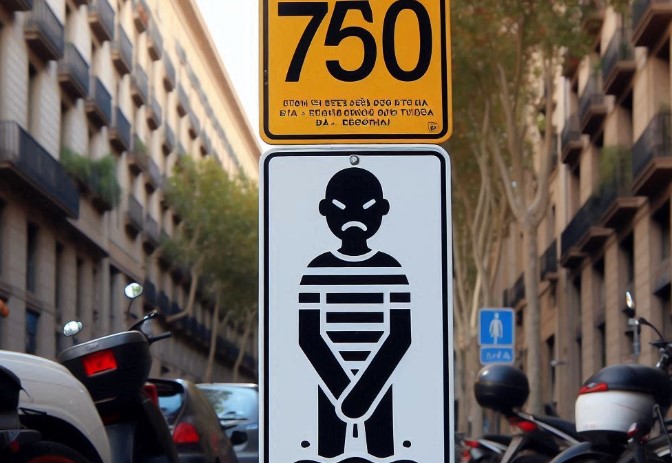The Barcelona City Council’s governing team presented a reform proposal on Friday to amend the Civic Education Ordinance. The goal of this project is to increase fines for rude behavior, reduce bonuses for timely payments, and update the list of punishable behaviors, in accordance with the previous ordinance passed 20 years ago. The draft is now before the various political parties and will be debated in the presidential commissions in June and July. The new ordinance is expected to be approved in plenary session by the end of the year, suggesting it will come into force in spring 2026.
A person caught by the Barcelona Metropolitan Police for urinating on public streets faces a fine of €300. This can be reduced to €75 if they pay promptly and claim a 75% early payment bonus. Once the new ordinance comes into force, the fine will range from €300 to €750, depending on the location of the offense, and the early payment bonus will be reduced to between 50% and 40%. The Organic Law for Citizen Protection—also known as the Gag Law—does not affect the increase in penalties for botellón and graffiti; the fines range from €100 to €600. However, the new bill will reduce the bonus to between 50% and 40% (previously, it was 75%). Despite the limitations of the Gag Law, the City Council has found legal leeway to increase the penalties for graffiti artists, requiring them to cover cleanup costs. Regarding botellón, the government team has managed to introduce a new punishable behavior: promoting alcohol routes. This is punishable by fines of between €1,500 and €3,000, while participants in botellones that also include minors face fines of €750 to €1,500.
Commissioner for Coexistence, Montserrat Surroca, emphasized on Friday that, in addition to innovations such as the “obligation for graffiti artists to cover cleanup costs,” the possibility of replacing economic sanctions with alternative or educational measures has also been created if the perpetrators belong to vulnerable groups.
Surroca defended the introduction of articles punishing acts against dignity and sexual freedom, as well as providing for reparation. “If we can sanction certain behaviors administratively, this could ultimately facilitate the filing of complaints,” Surroca explained, referring to behaviors such as “exhibitionism, masturbation, degrading verbal expressions, or touching,” which should not go unpunished in Barcelona. “If these offenses result in criminal charges and an acquittal, we could reclaim the administrative route, making the behaviors we don’t want in the city punishable,” she argued.
“We have also used the reform to update some behaviors related to noise and animals. For example, we have included the obligation to dilute animal urination,” the commissioner added. Another innovation in the ordinance allows non-residents in Spain to pay the fine to Guardia Urbana officers at the same time as the punishment is imposed.
Deputy Mayor for Security Albert Batlle explained that discussions have taken place with all municipal groups, except Vox, to draft the new ordinance. “Our goal is to reach agreements with all parties and incorporate all the suggestions that are brought to our attention. However, we want to avoid losing valuable time,” he argued. “We are concerned that fines are not being imposed; we want to tighten the sanctions regime and, at the same time, intensify the civic campaign,” Batlle said. “There are fines related to botellón that are paid, but those for street trading are higher,” Surroca admitted. “Alternative measures to fines were not included in the decree and must be added later. One example would be requiring graffiti artists to remove their own graffiti. We must continue working on this,” the Coexistence Commissioner concluded.




